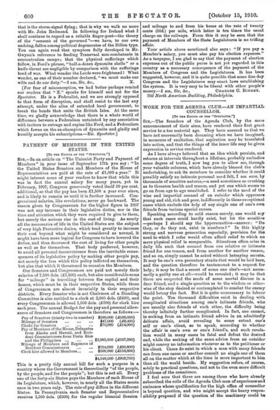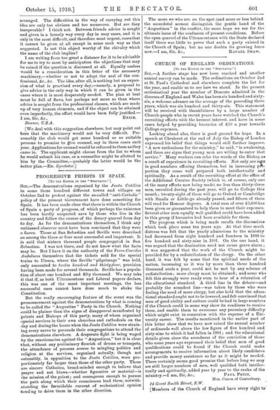WORK FOR THE AGENDA CLUB.—AN IMPARTIAL COUNSELLOR.
[To THE EDITOR Or THE "SPECTATOR."] SIR,—The founders of the Agenda Club, by the mere announcement of their aims, have rendered their first great service to a too material age. They have assured us that we have not necessarily been dreaming when we have imagined, in moments of exaltation, that aspiration may be translated into action, and that the things of the inner life may be given expression in service rendered.
As I have always believed that an idea which persists, and returns at intervals throughout a lifetime, probably embodies some degree of truth, I now beg you to allow me, through your valuable columns, which have already blessed the club's undertaking, to ask its members to consider whether it could
possibly satisfy an intimate personal need felt, I am sure, by thousands of sensitive natures,—a need sometimes so crushing as to threaten health and reason, and yet one which seems to go on from age to age unsatisfied. I refer to the need of the wise and impartial counsel of an outsider which oppresses young and old, rich and poor, indifferently in those exceptional cases which exclude the help of any single one of one's own friends from various special causes.
Speaking according to cold reason merely, one would say
that such cases could hardly exist, but let the sensitive —perhaps I should say the hypersensitive—answer : "Do they, or do they not, exist in numbers ? " In this highly strung and nervous generation especially, provision for the need to which I refer would often afford relief to which no mere physical relief is comparable. Situations often arise in daily life such that counsel from one relative or intimate friend for one reason, and from another for another reason, and so on, simply cannot be asked without betraying secrets. It may be one's own pecuniary straits that would be laid bare, and the question therefore be tantamount to a request for help ; it may be that a secret of some one else's—not neces- sarily a guilty one at all—would be revealed ; it may be that there are suspected the seeds of some mortal disease in a dear friend, and a single question as to the wisdom or other- wise of the step desired or contemplated to combat the enemy would betray the fact. But it is quite unnecessary to labour the point. Ten thousand difficulties exist in dealing with complicated situations among one's intimate friends, who are usually also friends of each other, the difficulty being thereby infinitely further complicated. In fact, one cannot, in seeking from an intimate friend advice in an admittedly delicate affair, avoid revealing to some extent one's self or one's client, so to speak, according to whether the affair is one's own or one's friend's, and such revela- tion would in many cases be fatal and defeat the desired end, while the seeking of the same advice from an outsider might convey no information whatever as to the petitioner or his client. Cases do exist in which a man with many friends can from one cause or another consult no single one of them all on the matter which at the time is more important to him than all the world beside. My suggestion refers, of course, solely to practical questions, and not to the even more difficult problems of the conscience.
I feel sure that there are among those who have already
subscribed the rolls of the Agenda Club men of experience and eminence whose qualification for the high office of counsellor is beyond question, and who might accept the heavy respon- sibility proposed if the question of the machinery could be
arranged. The difficulties in the way of carrying out this idea are only too obvious and too numerous. But are they insuperable? I think not. Between friends advice is sought and given in a homely way every day in easy cases, and it is only in the most difficult, and therefore most urgent, cases that it cannot be given at all except in some such way as that suggested. Is not this object worthy of the chivalry which the name of the club implies ?
I am writing from too great a distance for it to be advisable for me to try to meet by anticipation the objections that may be raised if the question is discussed at all. Equally useless would be a consideration in this letter of the necessary machinery,—whether or not to adopt the seal of the con- fessional, &c., &c. The idea, after all, is nothing but an expan- sion of what is practised every day,—namely, a proposal to give advice in the only way in which it can be given in the eases where it is most desperately needed. The plan at best must be full of flaws, but perhaps not more so than where advice is sought from the professional classes, which are made up of very human elements, and if the object can be attained even imperfectly, the effort would have been fully justified.— [We deal with this suggestion elsewhere, but may point out here that the machinery would not be very difficult. Pre- sumably the club would get some hundred or so suitable persons to promise to give counsel, say in three cases each year. Applications for counsel would be referred to them as they came in. The applicant might choose from the list to whom be would submit his case, or a counsellor might be allotted to him by the Committee,—probably the latter would be the better plan.—En. Spectator.]















































 Previous page
Previous page